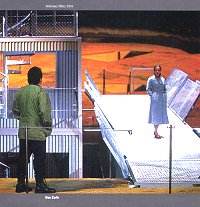
Staatsoper Stuttgart has achieved a triumphant production of Verdi's
complex work. Josi Wieler and Sergio Morabito's theatrical
direction has re-created this opera on a deeply analytical level for an audience
of the 21st century. Erich Wonder's steely cold see-through
metal construction set is a powerful symbol, a symbol for the power structures
which imprison all the characters, even those who think they are free agents.
Together with Dieter Billino's mostly harsh lighting, this team has
brought out the political tug-of-war which underlies Don Carlo,
as well as the personal predicaments of the people trapped aware or unaware
within its mesh.
The conflicts between church and state are perhaps no longer of burning interest but abuse of power, resistances and conflicts between freedom of action and duty are still relevant. Ruthless manipulation of human beings is as much a problem today as it was perceived by Verdi. It is to this production's credit not to have confined and distanced the harsh political and personal predicaments into a historical past, but to have updated the action and placed it into our own midst.
The team has re-created believable beings caught in believable situations and achieved a production which is emotionally as well as intellectually gripping. The characterisation through movement and body language in great detail was breathtaking to behold. Nearly all the singers managed to give as good an acting as a musical performance. No mean achievement. Roland Bracht as Filippo, the king, paraded like an automaton of a business chief executive, ruthless, harsh and only just able to unbutton (literally) to show us his own vulnerability. Vladimir Kuzmenko as Don Carlo was a marked victim from his first entrance, guileless, somewhat clumsy, open, unguarded and lovesick. Anja Rabes, responsible for costume, turned him almost into the boy from next door in jeans, trainers, scarf and a fateful teeshirt bearing his own portrait, thereby literally and metaphorically exposing his being. When this teeshirt is snatched off him by Countess Eboli at a crucial moment, it looks as if his soul is torn from him, and we know all is lost. The production abounds in countless significant and signifying detail.
Catherine Naglestad as Elisabetta gave a stupendous performance. She combined the charm of an innocent young girl with dignity and showed herself capable of great moral strength when called upon to serve the interests of her people. The war situation and its resolution are in the background to the political and personal conflicts. They were brilliantly and economically intimated with faint pictures of 20th century soldiers painted on the first act backcloth. Four oversize soldiers appeared like ghosts on a front cloth as if helping to shape Elisabetta's decision to make personal sacrifices for the common good. Tichina Vaughn as the Countess Eboli had her double life covered up with an immaculate white suit. She had great acting and singing presence. The most complex character, Rodrigo, was presented as a dubious fellow with untidy lank hair, shifty, betraying unease, hands nearly always in his pockets as if suppressing and hiding something. This was a tour de force characterisation by Motti Kaston. As the chief Inquisitor and chief manipulator, Attila Jun perhaps did not show sufficient disdain, or a ruthless enough disposition, in his singing or acting. Gabriela Herrera sang and moved convincingly as the young pageboy Tebaldo.
The orchestral playing under Lothar Zagrosek had great clarity and moved the action forward with a barely suppressed musical tension and precision that gripped the listeners. He must take a great deal of credit for the understated singing style which made it more a company ensemble type of production (like we have come to expect at Glyndebourne) instead of one in which famous singers come and deliver (often ignoring Verdi's careful dynamic markings) to establish their stardom. We will never forget Catherine Naglestad singing, as if to herself, in the heart wrenching final duet with Carlo as she confirms there is no way back and he must make a life for himself apart from her.
This production confirms our impression, gained with Pique Dame last year, that the Stuttgarter Staatsoper is a centre of excellence. This production is well worth a special trip. From London there are cheap flight deals to Frankfurt and fast space-age trains from the airport to Stuttgart in just over one hour, with plugs by each seat for your earphones to choose from 6 programmes!
Alexa Woolf
 Return to:
Return to: